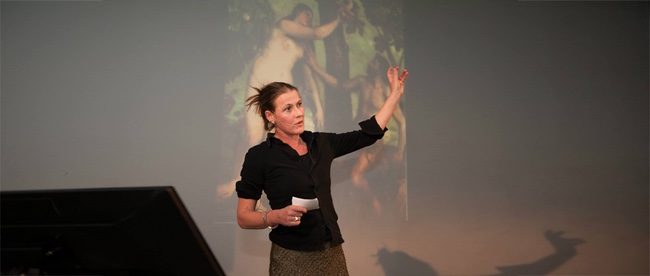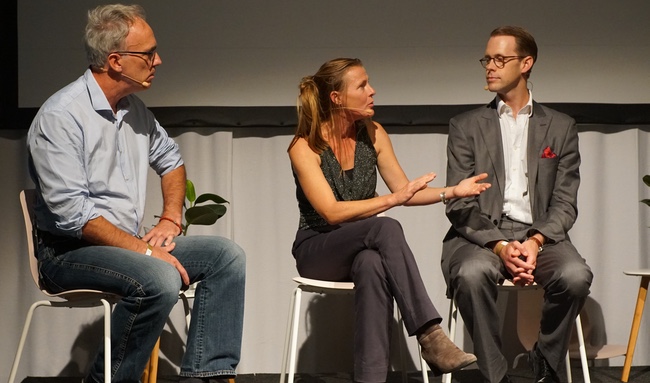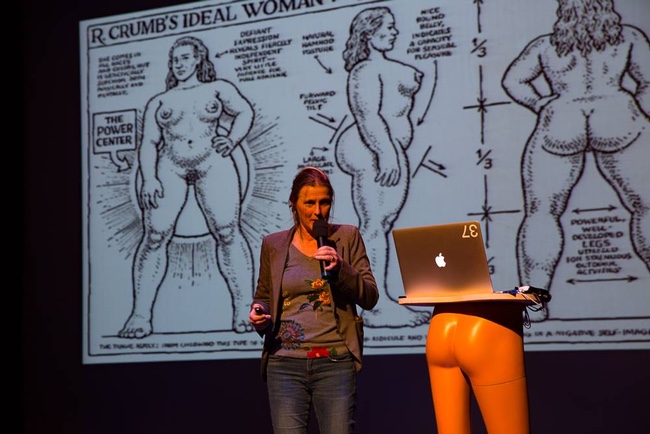Ellen ter Gast

Ellen has a unique voice in the debate about technology and ethics. As a medical biologist and PhD philosopher, she moves effortlessly between the lab and the stage, between science and science fiction. Her specialty? Cross-disciplinary areas. Boundaries between nature and technology, between fact and fiction, and between human and machine. In her lectures, she stimulates her audience with questions such as: Why do we fantasize about love between humans and robots? What do we really mean when we say we are ‘playing God’? And what can managers learn from neuroscientists about learning systems? But also: what lessons can and can’t we draw from Hollywood stories?
With her background in both biology and philosophy, and a fascination with technology, it was clear Ellen wanted to do her PhD on a boundary spanner: the genetically modified mouse, the pioneer of the biotech revolution: Not the human but the mouse deserves the Nobel Prize.
Her preference for discussing ethics through contemporary films and series was captured in her book: The Brave Viewer: Why Netflix Has More to Offer Than Kant (2018). In it, she shows how our thinking about technology is deeply influenced by the stories we tell each other, from Frankenstein to Black Mirror, from Brave New World to Her. No discussion of artificial intelligence or genetic manipulation is complete without the influence of film and fiction (but beware: science fiction is not science fact!)

Thanks to her multidisciplinary background and broad professional experience, she is uniquely positioned to offer a fresh perspective on developments and to build bridges between worlds. A selection of her diverse experience: researcher on neural network development (Netherlands Institute of Neuroscience), researcher into Learning organizations (Erasmus University), management consultant, head lecturer in bioethics (Leiden University), and ethics and integrity expert (ABN AMRO).
Although Ellen holds a PhD in philosophy, she knows that true wisdom doesn’t come from books, but from real life. Ellen is always thoroughly prepared and, as a true philosopher, knows how to ask the critical follow-up questions. She effortlessly combines a professional presence and humor with a disarming style, making her the ideal speaker for organizations looking for something other than “just another man in a suit.”

Ellen at Supermensch
Lectures she has given previously:
The Evolution of the Brain in Times of Information Overload
In a world full of constant stimuli, notifications, updates, and never-ending choices, our brains are getting increasingly crowded. But are they actually built for that?
In this lecture, Ellen ter Gast — who graduated as a medical biologist on the development of neural networks — takes you on a journey through the evolutionary development of the brain. From the first simple neural networks in worms and insects to the complex, learning systems of the human brain. She shows how our brains continually adapt to our environment, and what happens when that environment suddenly changes radically, as it has in the digital era.
Using recent brain research, she explains how learning processes work on a neural level. What happens when we learn something new? What does “use it or lose it” really mean for the way we process, retain, or forget information? What happens in our brains when we pay attention (focus)? And how do the networks in our brain change when we are constantly exposed to an overload of information?
One thing she can already reveal: we don’t learn through endless input (supply), but through curiosity, pattern recognition, and especially a question-driven approach.
In Love with Robots?
In debates about robotics, science fiction scenarios play an important role. That’s not surprising, because Hollywood understands that humans are deeply technical beings, fascinated by the blurring line between human and machine. On the big screen, the great stories about human-machine-technology come to life. What do these stories tell us about our deepest fantasies? Aren’t robot stories always about ourselves, about being human? Why do men fantasize about female robots? What does that teach us about love? Will robots ever love us back?
Better than God?
Whether it’s about cloning, gene-editing technologies like CRISPR-Cas, Deep Brain Stimulation, or genetic screening, every debate about the societal implications of biotechnology raises the question: are we allowed to ‘play God’? And in crossing scientific boundaries, are we also crossing moral boundaries? In answering these questions, Ellen critically examines commonly used notions like perfection, enhancement, evolution, manipulability, health, free will, and God. What do we mean when we talk about the blueprint of life? After all, we are not machines… are we?
Ellen ter Gast on *The Brave Viewer*, Broadcast Magazine, 2022:
Ellen ter Gast in conversation with Dolf Jansen about *The Brave Viewer* on *Spijkers met Koppen*.
How does cloning work? Ellen ter Gast explains it on *Pauw*.

